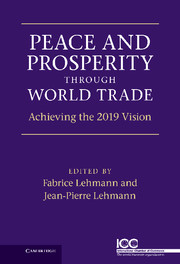Book contents
- Frontmatter
- Contents
- Notes on contributors
- Foreword
- Preface: the ICC vision
- Historical overview and dynamics
- Editorial note
- A Global systemic transformations
- B Governance of global trade
- C Poverty and global inequities
- D The long view on interlocking crises
- E Global business responsibilities
- Editorial introduction
- E1 Responsible leadership
- E2 For great leadership
- E3 A lesson on trade, regulation and competition policy?
- E4 International trade and business ethics
- E5 Who's driving twenty-first century innovation? Who should?
- E6 Responsible sourcing
- E7 Trade, international capital flows and risk management
- E8 Trade, corporate strategies and development
- E9 How can trade lead to inclusive growth?
- E10 Trade and human rights: friends or foes?
- E11 Trade: the spirit and rule of law
- Conclusion: the imperative of inclusive global growth
- Index
E6 - Responsible sourcing
Published online by Cambridge University Press: 05 July 2011
- Frontmatter
- Contents
- Notes on contributors
- Foreword
- Preface: the ICC vision
- Historical overview and dynamics
- Editorial note
- A Global systemic transformations
- B Governance of global trade
- C Poverty and global inequities
- D The long view on interlocking crises
- E Global business responsibilities
- Editorial introduction
- E1 Responsible leadership
- E2 For great leadership
- E3 A lesson on trade, regulation and competition policy?
- E4 International trade and business ethics
- E5 Who's driving twenty-first century innovation? Who should?
- E6 Responsible sourcing
- E7 Trade, international capital flows and risk management
- E8 Trade, corporate strategies and development
- E9 How can trade lead to inclusive growth?
- E10 Trade and human rights: friends or foes?
- E11 Trade: the spirit and rule of law
- Conclusion: the imperative of inclusive global growth
- Index
Summary
What is responsible sourcing?
Responsible sourcing, also referred to as supply chain responsibility, is a voluntary commitment by companies to take into account social and environmental considerations when managing their relationships with suppliers.
This strategy is now an integral part of effective supply chain management. Responsible sourcing practices contribute to efficiency and continuity of the supply chain in the long run.
As production chains expand, companies of all sizes and sectors are devoting more efforts to managing supply chain risks and building effective supplier relationships. Improving social and environmental performance in production chains is becoming a major element of this process.
As experience has shown, one bad incident with one supplier can lead to a disproportionate amount of adverse publicity, damaging a company's reputation and brand image. This has led a growing number of companies to develop and promote responsible sourcing practices.
Indeed, effective supply chain management is a way for businesses to build a competitive advantage, especially in sectors where production is largely outsourced, such as clothing, footwear, electronics, or food products.
For many companies, working towards improving social and environmental standards in the supply chain has become a natural extension of their commitment to corporate responsibility and, as such, forms part of their overall business model.
- Type
- Chapter
- Information
- Peace and Prosperity through World TradeAchieving the 2019 Vision, pp. 259 - 263Publisher: Cambridge University PressPrint publication year: 2010

